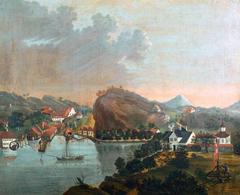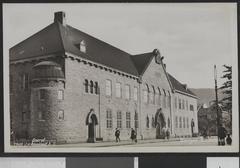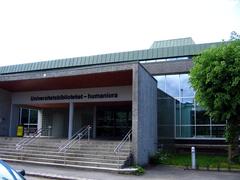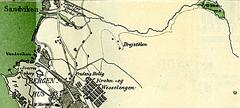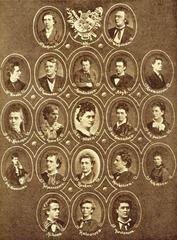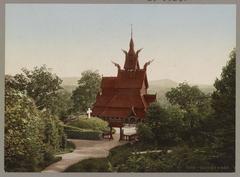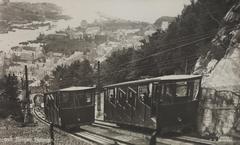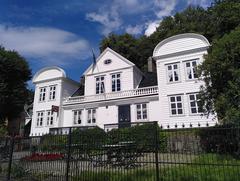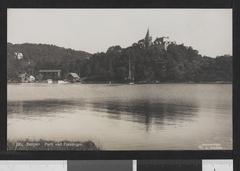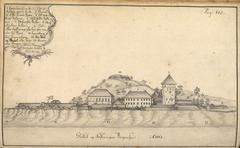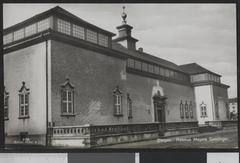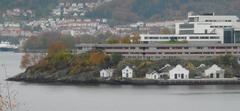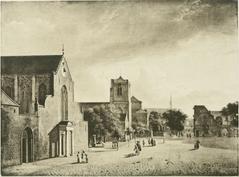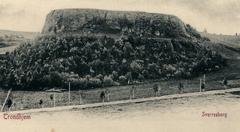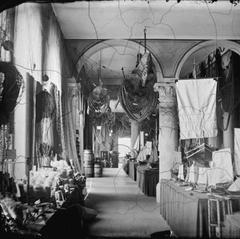Hordamuseet Visiting Hours, Tickets, and Bergen Historical Sites Guide
Date: 04/07/2025
Introduction to Hordamuseet Bergen
Nestled in the scenic Fana district, just south of Bergen, Norway, Hordamuseet stands as a premier cultural institution dedicated to preserving and presenting the rural heritage of the Hordaland region. Also known as the Horda Museum or Bymuseet i Bergen, this open-air museum offers visitors an immersive journey into the traditional industries, crafts, and ways of life that have shaped Western Norway’s historical and cultural identity. Spread across picturesque grounds by the Fanafjorden and Fanafjellet hills, Hordamuseet features over 30 historic buildings, including farmhouses, workshops, and boathouses, all carefully relocated and restored.
Established as part of a Norwegian movement in the late 19th and early 20th centuries to document and safeguard disappearing rural customs, Hordamuseet’s collections range from prehistoric artifacts to intricate tapestries that narrate legendary sagas. The museum’s focus extends from agriculture and maritime traditions to infrastructural development, as seen in its collaboration with the Norwegian Road Museum.
Hordamuseet is not only a repository of artifacts but also a vibrant educational hub. It offers guided tours, workshops, and cultural festivals, enriching Bergen’s status as a UNESCO World Heritage and European City of Culture. This guide provides all essential information—visiting hours, ticketing, accessibility, practical tips, and more—to ensure a rewarding visit, whether you are a history enthusiast, family, or cultural explorer (Fjord Norway, DigitaltMuseum, Visit Bergen, WhichMuseum).
Table of Contents
- Introduction
- Origins and Historical Development
- Architectural and Material Heritage
- Traditional Industries and Economic Life
- Social and Cultural Practices
- Archaeological and Historical Significance
- Educational and Community Impact
- Role in Bergen’s Cultural Landscape
- Recognition and Significance
- Museum Layout
- Collections Overview
- Visitor Information
- Visitor Services and Amenities
- Visitor Experience: Atmosphere and Engagement
- Practical Tips for Visitors
- Nearby Attractions in Bergen
- Frequently Asked Questions (FAQ)
- Conclusion and Call to Action
Origins and Historical Development
Hordamuseet was established to safeguard the cultural and economic history of Western Norway, where communities have relied on agriculture, fishing, and crafts for centuries. Its open-air exhibits, featuring 30 traditional buildings relocated from across Hordaland, preserve architectural heritage and provide an immersive experience of rural life (Fjord Norway). The museum’s founding reflects nationwide efforts to document disappearing rural traditions and customs.
Architectural and Material Heritage
The museum’s buildings—including farmhouses, workshops, and boat shelters—highlight the architectural diversity of rural Hordaland. The Boat Hall, housing 26 traditional boats, underscores the region’s maritime legacy. The Norwegian Road Museum section illustrates infrastructural developments that influenced rural communities (Fjord Norway).
Traditional Industries and Economic Life
Exhibits at Hordamuseet spotlight agriculture, fishing, and crafts integral to Hordaland’s communities. Visitors can explore farm tools, textiles, reconstructed farm environments, and fishing artifacts. Workshops and live demonstrations allow hands-on engagement with traditional skills (Fjord Norway).
Social and Cultural Practices
The museum offers insights into local customs, family structures, gender roles, and community organization through its building arrangements and artifacts. The summer farm buildings (seterdrift) on Fanafjellet illustrate seasonal livestock movement, a vital tradition in the region (Fjord Norway).
Archaeological and Historical Significance
Hordamuseet’s archaeological collections feature tools, pottery, and everyday objects from prehistoric times, enriching the understanding of human settlement and cultural continuity in Hordaland (Fjord Norway).
Educational and Community Impact
The museum serves as an educational hub, offering guided tours, workshops, and school programs that foster appreciation for traditional skills and environmental stewardship. It also hosts cultural events and festivals, strengthening regional identity and intergenerational learning (Fjord Norway).
Role in Bergen’s Cultural Landscape
As part of the Bergen City Museum network, Hordamuseet complements other local museums by focusing on rural life and traditional industries, further enhancing Bergen’s reputation as a UNESCO World Heritage City and European City of Culture (Visit Bergen).
Recognition and Significance
Consistently ranked among Norway’s best museums, Hordamuseet is recognized for its comprehensive collections and dedication to preserving the regional identity of Hordaland (WhichMuseum).
Museum Layout
Outdoor Museum Grounds
Situated approximately 16 km south of Bergen’s center, Hordamuseet’s outdoor section immerses visitors in traditional rural and coastal environments, with historic buildings and landscapes arranged to reflect their original settings (DigitaltMuseum).
Traditional Buildings
- Farmhouses & Outbuildings: Furnished interiors representing varied periods and social classes.
- Boathouses & Sheds: Featuring fishing tools and boat maintenance equipment.
- Stølsmuseet on Fanafjellet: A site with nine summer farm buildings that showcase the tradition of seterdrift (DigitaltMuseum).
Indoor Exhibition Spaces
Main Exhibition Hall
Permanent and temporary exhibitions cover handicrafts, rural industries, agriculture, and maritime life, with tools, artifacts, and interpretive displays.
The Boat Hall
A modern hall featuring a renowned collection of open, clinker-built boats typical of Western Norway, displayed with multimedia panels (DigitaltMuseum).
Special Exhibition Areas
- Ragna Breivik Tapestry Gallery: Exhibits tapestries depicting the saga of Åsmund Frægdegjeva, following Gerhard Munthe’s designs.
- Norsk Vegmuseum Collaboration: Displays historical road-building equipment from Hordaland.
Collections Overview
- Buildings: Over 30 structures from Nord- and Midhordland, from log cabins to elaborate farmhouses, all furnished with period artifacts (DigitaltMuseum).
- Boats: Traditional rowing and sailing vessels, some from the 18th–19th centuries, with ongoing restoration projects.
- Tools & Equipment: Agricultural tools, fishing gear, textiles, costumes, and blacksmith-forged items.
- Archaeological Finds: Includes stone tools, Viking Age artifacts, coins, and religious relics.
- Art & Tapestries: Ragna Breivik’s tapestries narrate Norwegian legends (DigitaltMuseum).
- Road-Building Machinery: In partnership with Norsk Vegmuseum, showcasing equipment and documentation of road construction.
Visitor Information
Visiting Hours and Tickets
- Main Season (April–October): Daily, 10:00 AM – 5:00 PM
- Winter Season: Check the official website for reduced hours
- Tickets:
- Adults: NOK 120
- Seniors/Students: NOK 90
- Children under 16: Free
- Family and group discounts available
- Advance Booking: Recommended for guided tours and group visits ([email protected])
Getting There and Parking
- Address: Hordnesvegen 24, 5244 Fana, Bergen, Norway
- By Public Transport: Light Rail (Bybanen) Line 1 to Lagunen, then bus 60, 61, 62, or 64 to Stend (Visit Bergen)
- By Car: Free parking is available; follow E39 and RV 546.
Accessibility
- Main building and café are wheelchair accessible; outdoor areas have gravel and grass paths.
- Assistance is available for visitors with disabilities (bymuseet.no).
Guided Tours & Events
- Guided tours available in Norwegian and English; book in advance.
- The museum hosts workshops, craft demonstrations, and seasonal events (Fjord Norway).
Café and Museum Shop
- The on-site café serves light meals and local specialties; the shop offers handicrafts and books.
Event and Group Facilities
- Venues such as Tøsdalsløa barn and Holsundhuset are available for private events; contact [email protected] for rentals.
Visitor Experience & Practical Tips
- Allow 2–3 hours to explore both indoor and outdoor exhibits.
- Dress in layers and bring rain gear; Bergen’s weather is variable.
- Wear sturdy footwear for uneven terrain.
- Photography is permitted for personal use; avoid flash indoors.
- Family-friendly: Interactive workshops and events for children.
- Pets: Not allowed indoors; may be permitted outside on a leash—confirm in advance.
Nearby Attractions
- Siljustøl: Harald Sæverud’s home and museum
- Arboretet & Bergen Botanical Garden: Themed gardens and plant collections
- Troldhaugen: Edvard Grieg’s home and concert venue
- Bryggen Wharf and Mount Fløyen for further cultural and outdoor experiences
Frequently Asked Questions (FAQ)
Q: What are the main visiting hours?
A: April–October, daily from 10:00 AM to 5:00 PM; reduced winter hours—check the official site.
Q: How do I buy tickets?
A: Online or at the entrance; advance booking recommended for tours.
Q: Is the museum wheelchair accessible?
A: Main indoor areas are accessible; outdoor terrain may be uneven.
Q: Are guided tours available in English?
A: Yes, with advance booking.
Q: Can I bring children and pets?
A: The museum is family-friendly; pets allowed outside on a leash (confirm before visiting).
Conclusion and Call to Action
Hordamuseet is a must-visit for anyone interested in Norway’s rural and maritime heritage. The museum’s extensive collections, scenic setting, and engaging educational offerings make it one of Bergen’s top historical attractions. Plan your visit by checking the latest hours and ticket information, and consider booking a guided tour for deeper insights. Download the Audiala app for audio guides, and follow Hordamuseet on social media for the latest news and events.
For complete details, visit the official Fjord Norway Hordamuseet page, DigitaltMuseum, and Bergen City Museum website.
References
- This is a sample text. (Fjord Norway)
- This is a sample text. (DigitaltMuseum)
- This is a sample text. (Visit Bergen)
- This is a sample text. (WhichMuseum)
- This is a sample text. (bymuseet.no)
